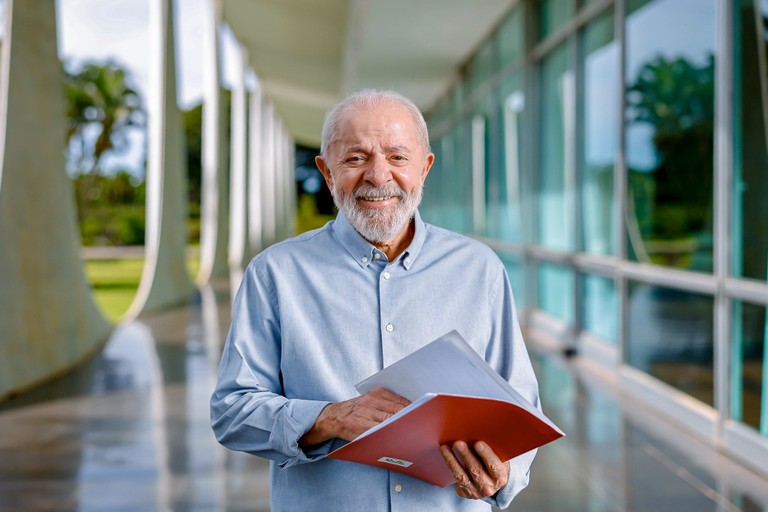Advanced cookie settings
To improve your experience on the platform and provide personalized services, we use cookies.
Notícias
INTERVIEW

According to Lula, education is key to development and making Brazil competitive. Image: Ricardo Stuckert / PR
In an interview with Rio de Janeiro’s Rádio Tupi FM on the morning of Thursday, February 20, President Luiz Inácio Lula da Silva highlighted that the Pé-de-Meia Program has established itself as an essential public policy to combat school dropout and expand the range of opportunities for low-income teenagers.
Pé-de-Meia is a revolution. We discovered that half a million young people were dropping out of high school to help with the family budget. So we decided to create a savings account for these youth”
Luiz Inácio Lula da Silva, President of the Republic
During the conversation, Lula emphasized that the program encourages students to stay in school and helps build a future in which there is more dignity and autonomy. “The Pé-de-Meia is a revolution. We discovered that half a million young people were dropping out of high school to help with the family budget. I wondered how a president could allow half a million young people to drop out of school to help their families. So we decided to create a savings account for these youth,” he explained.
The program is aimed at students enrolled in public high schools who are beneficiaries of the Unified Registry for Social Programs of the Federal Government (Cadastro Único para Programas Sociais do Governo Federal/CadÚnico). It works like a savings account to promote student permanence, school completion, and participation in the National High School Exam (Exame Nacional do Ensino Médio/ENEM), which opens doors to higher education.
Upon proving enrollment and attendance, students receive a monthly incentive of BRL 200 which can be withdrawn at any time. The beneficiary also receives BRL 1,000 at the end of each year, an amount that can only be withdrawn after high school graduation. Considering incentive installments, annual deposits, and the additional BRL 200 for participating in ENEM, the amounts add up to BRL 9,200 per student.
“There are almost 4 million students in the program; in Rio de Janeiro, 276 thousand students are receiving it. This is our commitment. If we don’t invest in young people when they need it, later on we will invest in fighting organized crime, in building prisons. I’d rather invest in classrooms,” Lula pointed out.
Nós vamos colher muita coisa daqui para frente nesse país. O Pé-de-Meia é uma revolução na educação. Vamos impedir que a evasão escolar seja a regra, e garantir uma poupança para que eles possam estudar. Só no Rio de Janeiro são 276 mil estudantes beneficiados.…
— Lula (@LulaOficial) February 20, 2025
CELL PHONES IN SCHOOLS — In another part of the interview, the President mentioned the restriction on the use of cell phones and other portable electronic devices during class, recess, or break time for all stages of basic education. Last Wednesday (19), the presidential decree regulating the law was published in the Official Gazette (Diário Oficial da União). “Children must not become algorithms. Children must become humanists. People with hearts, who think, who have a fraternal spirit, and who go back to playing, to talking with friends. This is the country I want to build,” stated Lula, emphasizing that the measure allows students to focus more on learning and social interaction.
INVESTMENT — According to the President, education is key to development and making Brazil competitive. Lula observed that a total of 100 Federal Institutes are being built across the country, five of them in Rio de Janeiro, adding up to 35 in the state. “We cannot be exporters of soybeans, iron ore, corn, or rice only. We have to be exporters of knowledge and intelligence,” Lula summarized.
GENIUSES AT HOME — Lula also mentioned the creation of the Faculty of Mathematics in Rio de Janeiro, with scholarships for the best students in the country's Mathematics Olympiads. He mentioned the creation of Full-Time School, which provides 1 million places throughout the country, and the Pé-de-Meia Licenciaturas, a financial incentive for students with high performance in ENEM to choose courses that train teachers. “We want our geniuses to stay in Brazil instead of having to go abroad to study,” he said.
CARE — During the interview, the President also highlighted the federal priority around health, arguing that people must be taken care of seriously. Lula reiterated the resumption of services and works delivered at federal health institutions in Rio de Janeiro which have resumed the offer of reference care. This is the recent case of the Emergency Room at the Bonsucesso Federal Hospital, which had been closed for five years. “This is how we are investing. The Federal Government cannot have hospitals being idle for five years and without ICUs. This was a total irresponsibility.”
PEOPLE’S PHARMACY — Lula also spoke about the recent decision to offer —free of charge— the 41 medications listed in the People’s Pharmacy (Farmácia Popular) program. This includes the provision of geriatric diapers to the eligible public, such as people aged 60 or over. Dapagliflozin, used to treat diabetes associated with cardiovascular disease, is also now offered to patients at no cost. According to estimates by the Ministry of Health (Ministério da Saúde), the measure will directly benefit more than 1 million people every year, mainly the elderly, who previously had to provide a co-payment for some supplies. “This is how we are going to take care of this country: with greater seriousness, without lies, trying to prove to the people that things can happen, and it will continue like this. The economy is growing, education is receiving investment, health is receiving investment, construction, ports, and airports are receiving investment,” he listed.
